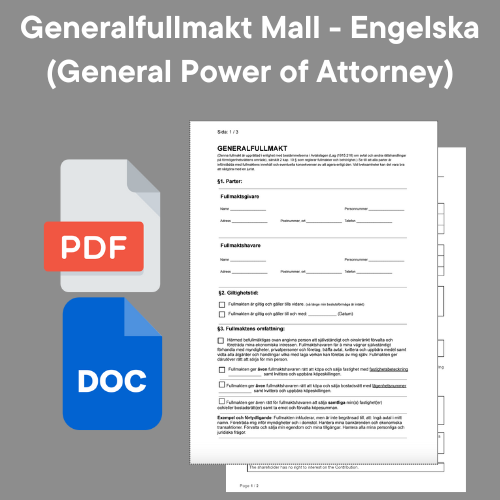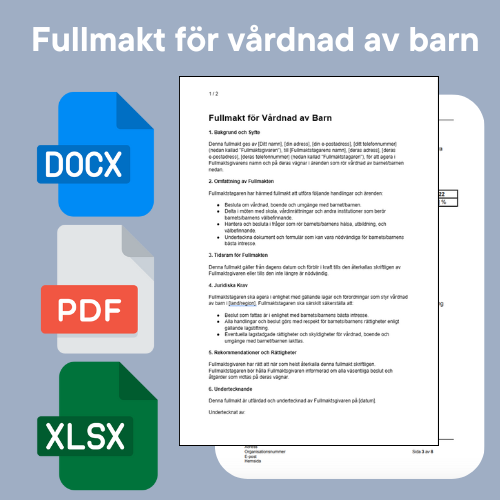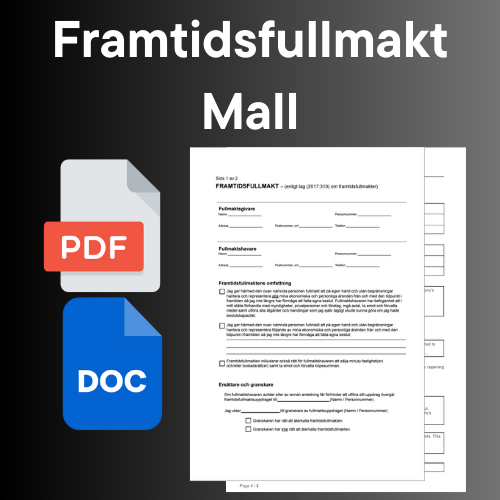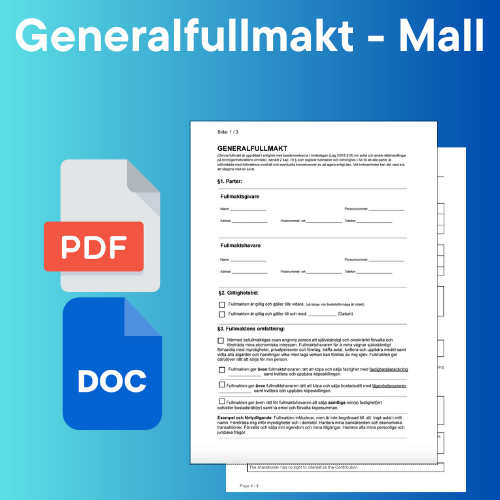Invoke Future Power of Attorney
Share
Invoking Power of Attorney: A Complete Guide
Introduction
Invoking a power of attorney is a central issue for many who want to ensure that their personal and financial affairs are handled according to their wishes if they can no longer make decisions for themselves. A future power of attorney is a legal document that allows you to appoint someone else to take care of these affairs when, for example, due to illness or impaired health, you no longer have the ability to do it yourself. In this article, we review what the law says about powers of attorney, common mistakes, and give examples of legal disputes that may arise.
What is a Power of Attorney?
A future power of attorney is a written agreement drawn up by one person (the power of attorney) and gives another person (the power of attorney) the authority to represent the power of attorney when he can no longer do so himself due to loss of decision-making capacity. Powers of attorney were introduced by law (2017:310) to give people more control over who will manage their affairs when they can no longer make decisions for themselves.
Why is a Power of Attorney Important?
There are several reasons why you should consider establishing a future power of attorney:
- Personal Control: You can choose yourself who will manage your affairs, instead of leaving this to a good man appointed by the superintendent.
- Flexibility: You can specify exactly which areas the power of attorney should cover, for example financial transactions, housing issues or the relationship with authorities.
- Security: By appointing a trusted person, you can feel secure that your interests will be taken care of in the way you wish.
Form requirements for a Valid Future Power of Attorney
For a future power of attorney to be valid, it must meet certain formal requirements:
- Writing: The power of attorney must be in writing and signed by the person giving the power of attorney.
- Attestation: Two witnesses must be present at the signing and attest that the power of attorney was of sound mind.
- Clarity: It must be clearly stated that the document is a power of attorney for the future, as well as what matters it covers and who is appointed as power of attorney.
When does the Future Power of Attorney take effect?
A power of attorney for the future comes into effect when the person giving the power of attorney can no longer manage his affairs due to, for example, a permanent illness or reduced mental capacity. It is usually the holder of the power of attorney who decides when this time has come, but it is also possible to decide that the district court shall examine when the power of attorney shall begin to apply.
Common Mistakes When Establishing Power of Attorney
Although a future power of attorney is a powerful tool for securing one's interests, certain mistakes can lead to serious problems:
- Unclear instructions: If the person giving the power of attorney is not clear about what the power of attorney should cover, it can lead to conflicts and ambiguities.
- Deficiencies in witnessing: If the formal requirements for witnessing are not met, the power of attorney can be declared invalid.
- Storage: As future powers of attorney do not need to be registered, it is important that the document is kept safely and that both the power of attorney and the power of attorney holder know where it is.
Legal Disputes and Examples
Disputes regarding future powers of attorney can arise if there is uncertainty about when the power of attorney came into effect, if the power of attorney is suspected of abusing his position, or if there is no agreement among the family members about how best to safeguard the interests of the power of attorney. A famous case is when a trustee is alleged to have benefited himself by selling assets at a discount, which led to a legal process where the superintendent was brought in to review the documents.
Invoke Future Power of Attorney
Invoking a power of attorney for the future means that the person appointed as power of attorney begins to use the power of attorney to take care of the affairs of the power of attorney. It is important that the grantor, when establishing the power of attorney, clearly specifies the conditions under which the power of attorney is to take effect. If there is a suspicion that the holder of the power of attorney is not carrying out his mission correctly, the superintendent can request an accounting or even prohibit the use of the power of attorney.




